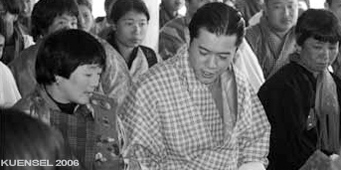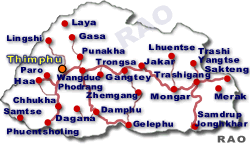| You are here: | Home > Bhutan > Topics > Politics > Constitution > Public consultations | Search |
 |
| Bhutan - Politics |
| Bhutan's new Constitution |
|
|
| Crown Prince conducts public consultations on the Constitution in Dagana |
|
|
08 February 2006
 |
|
Bhutan was not following a trend but consolidating the rapid and profound achievements of the past.
"The people of Bhutan have been entrusted with a great responsibility which we must make every effort to shoulder as power is devolved to the people, keeping in mind the interest of the people rather than ourselves," said His Royal Highness. "Without this concern for the greater good it will be difficult to fulfill the needs of the people and the country."
 |
|
His Royal Highness said that His Majesty the King had commanded the distribution of the draft Constitution to every household as well as all agencies and organisations in Bhutan so that the people would have the opportunity to suggest changes to the draft and to clarify doubts. His Majesty had also personally visited the dzongkhags to discuss the Constitution and commanded His Royal Highness to meet the people of Dagana and deliberate on each and every article at length. His Royal Highness encouraged the people to fulfill His Majesty's command by taking active part in the discussions.
The people expressed their worry that the Constitution and democracy may be coming too early to Bhutan given the large rural population whose interests may be forgotten if the Monarchy were to devolve power to political parties. His Royal Highness said it was true that His Majesty's reign had brought immense growth and progress to the country and that the people's aspirations had been fulfilled. However, His Royal Highness said, this was the reason why the time was opportune for such profound political changes. The people and government shared a relationship of trust and faith in each other and still had the benefit of the guidance and support of His Majesty. In such a time of peace and prosperity and under such a leadership, there was the greatest chance of success.
The people asked for the clause requiring the King to step down at the age of 65 years to be removed from the Constitution. His Royal Highness said that the concern of the people, not just of Dagana but of all the 20 dzongkhags, was a reflection of their love for the King. His Royal Highness said that the people had been further saddened by the command in December, 2005, that His Majesty would step down in 2008, at the age of 52 years. His Royal Highness explained that His Majesty felt that the Constitution must be drafted to benefit the people of the country not only in the present but hundreds of years into future. For this reason the clause had been personally proposed by His Majesty.
On article 3, 4, and 5 - on Spiritual Heritage, Culture and Environment - His Royal Highness said that these provisions were unique to Bhutan and that they were incorporated because of the central role that they played in the life of the nation. His Royal Highness said that spiritual and cultural heritage were of fundamental importance to a landlocked country between giant neighbours. As for the environment His Majesty's farsighted vision had ensured that the largest sources of Bhutan's revenue were the rich natural resources and biodiversity.
On Article 7, Fundamental Rights, the people voiced their apprehension that, with freedom of religion, Buddhism may be undermined. The Chief Justice said that, although Bhutan was a developing country, the fundamental rights enshrined in the Constitution were among the most comprehensive in the world.
He said that, while Bhutan was a Buddhist nation, it was also one with respect for people of all faiths. He added that it would be the absence of such respect and tolerance that would create problems, as it had in some countries around the world, rather than the freedom that Bhutan's Constitution provides.
His Royal Highness said that the Constitution was a Constitution for all the people of Bhutan and that it would not discriminate on the basis of religion, gender, or caste. He said that the best way to safeguard the fundamental rights of the people was to ensure the success of this democratic transition.
| In other words, to fulfill one's fundamental duties. |
His Royal Highness replied to questions on the Articles related to the National Council, National Assembly, and Political Parties. He explained the process of elections to these bodies as well as their functions in detail. He reiterated the importance of the people choosing the right candidates and political parties. He said that the people should also make the effort to understand the functions of these institutions and the role that the people themselves could play. If this responsibility was neglected the problems faced by people in other countries would begin to take root and the interests of the people would be forgotten by those in government.
On Article 23, Elections, the people asked if there were any restrictions on the participation in politics by members of the royal family, religious personalities, and civil servants. His Royal Highness explained that, under the draft Election Act, persons in these categories would not be permitted to stand for elections or to join politics other than fulfilling their duty as citizens by voting. In the case of royal family members His Royal Highness said that they would be required to renounce their status as royal family members if they chose to participate in politics.
His Royal Highness said that, in any case, he felt that the duty to serve the country and people did not fall on the King alone but on members of the royal family as well. The honour and privilege of being a member of the royal family brought with it a profound duty of service to the King, country and the people.
His Royal Highness added that religious personalities played a pivotal role in ensuring the peace and well being of a nation steeped in spirituality and culture. They had, throughout history, in good or difficult times, conducted prayers for the nation's peace and prosperity. Like royal family members the religious community played an irreplaceable and important role that could not be performed by other institutions. Such personalities occupied a special and sacred place in the nation's life and would be unbecoming for them to participate in politics.
Civil servants may, if they felt that they could better serve the country, choose to resign from the civil service and participate in politics. However, no civil servants would be permitted to join politics while they were a member of the government bureaucracy and institutions.
On the Articles on the Royal Audit Authority, the Royal Civil Service Commission, and the Anti-Corruption Commission His Royal Highness informed the people that the relevant Acts had all been drafted and would be submitted to the National Assembly for deliberations by the people's representatives.
His Royal Highness said it was important to ensure that corruption did not take hold in Bhutan, especially at this important juncture of political development. He said that, being spiritual people, Bhutanese officials and layman tended easily forgive those guilty of corruption. He told the people that it was their duty to build upon the strong and prosperous nation and pass on to future generations of Bhutanese a bright future.
Those guilty of corruption and other such acts jeopardized the nation's very stability and progress. They must be punished according to the law, without fear or favour, and unhampered by misplaced piety.
When all 34 Articles had been discussed His Royal Highness the Crown Prince reminded the people that the process of democratisation in Bhutan had been taking place for over 25 years. He said that His Majesty had constantly endeavoured to lay strong foundations to enable people to acquire the capacity to decide their own future.
Today the country had numerous local bodies with directly elected representatives who had decades of experience in decision-making, development planning, and budget allocation as well as elected representatives in the nation's highest legislative body, National Assembly. The country had enjoyed immense peace and progress without any of the problems that plagued other regions, such as corruption, discrimination, crime, and political instability. His Royal Highness said that the people must not waste this opportunity - in a time of stability and under the guidance of a peerless leader - to build a strong political system for the future.
His Royal Highness said that he felt deeply privileged because he had the good fortune to learn about service and love for the country, about the vision for Bhutan's future, and about hard work and integrity - everything he knew - from His Majesty the King. He added that most of the people at the meeting would be even better informed and knowledgeable because they had worked together with His Majesty since 1972, many years before His Royal Highness was born.
His Royal Highness said that the Constitution and the many changes it would bring were a reflection of the confidence and faith His Majesty had placed in the people. "It is our duty to work to fulfil His Majesty's vision," said His Royal Highness.
"After all it is a vision for the happiness and well being of all Bhutanese citizens."
His Royal Highness thanked the people who had travelled long distances for the meeting. He said that the discussions had been fruitful and that he was happy with the keen participation of the people.
The people of Dagana expressed their deep gratitude to His Majesty for the profound vision in empowering the Bhutanese people through decades of tireless effort. They recollected the threat to Bhutan's sovereignty and security and His Majesty's sacrifice and personal leadership during the military operation in 2003. The people offered prayers for the long lives and continued leadership of His Majesty the King and His Royal Highness the Crown Prince.
As His Royal Highness hosted a tokha for the people of Dagana after the meeting many people told Kuensel that they were overwhelmed by the presence and the confidence of the young Crown Prince.
However, many people expressed their concerns over the changes taking place. As 54-year old Rinzin of Drujegang said: "Monarchy is a time tested and most suitable system for Bhutan. It has realized the aspirations of the people. Politicians on the other hand are always associated with political problems. I hope this will not happen here. But if our King and Crown Prince so command, we must play our parts in bringing in the new democratic system. We hope, however, that the Monarchy will continue to provide close guidance and ensure a visionary Constitution that will stand out among the Constitutions of the world."
| This article was contributed by Ugyen Penjore and Rinzin Wangchuk, Kuensel, Bhutan's national newspaper, 2006 |
| Links |
| External links |
| Bhutan's
CONSTITUTION Constitution official website |
 |
|
|
